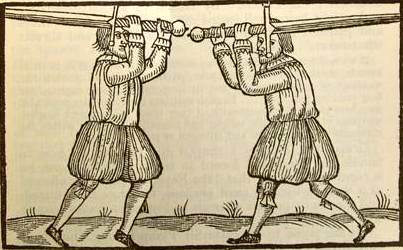The Duel
Though officially frowned upon*, duels for the sake of honour continued in Shakespeare's lifetime. His contemporary, Ben Jonson, fought a duel with another actor, Gabriel Spenser, and was found guilty of manslaughter*. Jonson, of course, was a mere actor and bricklayer. Members of the nobility would not have been charged.
The close relationship between the art and sport of fencing and duelling is illustrated in Hamlet, where the fencing contest rapidly changes to a duel when Hamlet realizes he has been tricked (see 5.2.304).
Shakespeare and the duel
The formality of the judicial combat--a duel which was to decide which of two combatants was in the right over some issue--is seen in the scene in Richard II when the Marshal and two heralds orchestrate the combat between Henry Bolingbroke and Thomas Mowbray. Richard's abrupt interruption (1.3.118) is startling, and can be seen as a lapse in chivalric decorum. In Romeo and Juliet, more spontaneous -- and illegal -- duels are fought by Romeo with Tybalt and Paris (3.1 and 5.3).
On a different level, two of Shakespeare's mature comedies exploit the potential humour in the duel. In Twelfth Night, the disguised Viola is co-erced into a duel with an equally reluctant foe, Sir Andrew Aguecheek; in As You Like It, Touchstone goes into great detail about the ritual of "giving the lie" in its various degrees of provocation, from the Retort Courteous to the Lie Circumstantial and the Lie Direct (but even the Lie Direct could be avoided with an "if").
Footnotes
-
A bleeding vein . . .
King James was opposed to duels, using language similar to that used by Shakespeare in describing the effect of rebellion in the History plays: "[duelling is] a vein [punning on 'vain'] that bleeds both incessantly and inwardly" (Proclamation Against Private Challenges and Combats, 1613).
-
Ben Jonson, the duellist
Jonson was thrown in Newgate jail, and would have faced death except that he was able to plead "benefit of clergy" because he could read Latin. Instead he lost all he owned and had his right thumb branded with a "T" (for the gallows at Tyburn that he would have been hanged from).
